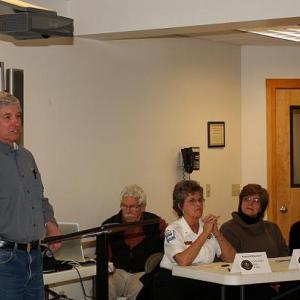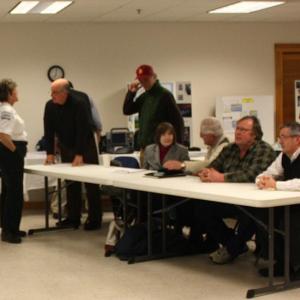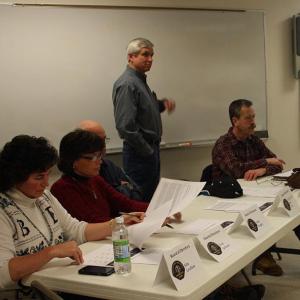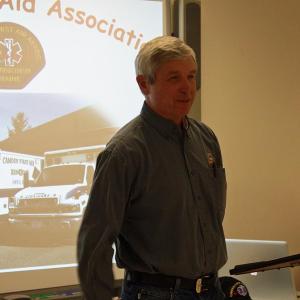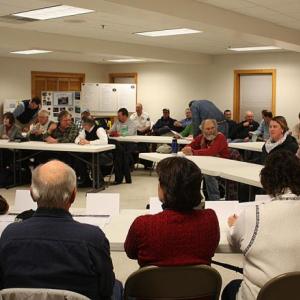Camden First Aid seeking $407,000 in funding from four-town taxpayers
 Steve Corson, chairman of the Camden First Aid Association Board of Directors, talks to selectmen, town managers and others from Camden, Rockport, Lincolnville and Hope Wednesday night. Also pictured, from left, CFAA paramedic Bill Bentley, EMS Chief Julia Libby, board member and Deputy EMS Chief Julie Allen, and board members Ramona Graves and Chris Sewall. (Photo by Holly S. Edwards)
Steve Corson, chairman of the Camden First Aid Association Board of Directors, talks to selectmen, town managers and others from Camden, Rockport, Lincolnville and Hope Wednesday night. Also pictured, from left, CFAA paramedic Bill Bentley, EMS Chief Julia Libby, board member and Deputy EMS Chief Julie Allen, and board members Ramona Graves and Chris Sewall. (Photo by Holly S. Edwards)
 CFAA EMS Chief Julia Libby talks to Camden Select Board member Jim Heard, at a table with Leonard Lookner, Camden Town Manager Pat Finnigan, Don White, John French and Martin Cates. (Photo by Holly S. Edwards)
CFAA EMS Chief Julia Libby talks to Camden Select Board member Jim Heard, at a table with Leonard Lookner, Camden Town Manager Pat Finnigan, Don White, John French and Martin Cates. (Photo by Holly S. Edwards)
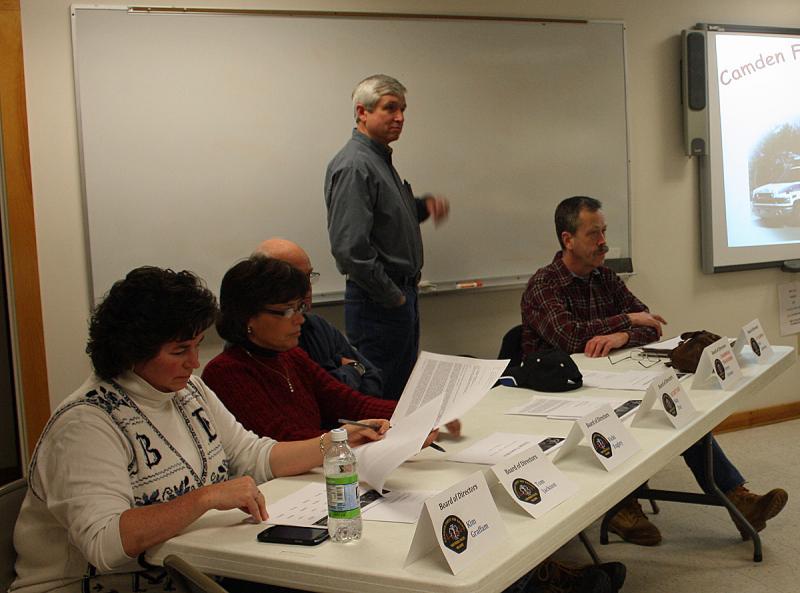 CFAA Board members Kim Graffam, Vicki Eugley, Skip Day (hidden), Steve Corson (standing) and Neil Courtney. (Photo by Holly S. Edwards)
CFAA Board members Kim Graffam, Vicki Eugley, Skip Day (hidden), Steve Corson (standing) and Neil Courtney. (Photo by Holly S. Edwards)
 Steve Corson, chairman of the Camden First Aid Association Board of Directors. (Photo by Holly S. Edwards)
Steve Corson, chairman of the Camden First Aid Association Board of Directors. (Photo by Holly S. Edwards)
 Selectmen and managers from Camden, Rockport, Lincolnville and Hope meet with the Camden First Aid Association board Feb. 27.(Photo by Holly S. Edwards)
Selectmen and managers from Camden, Rockport, Lincolnville and Hope meet with the Camden First Aid Association board Feb. 27.(Photo by Holly S. Edwards)
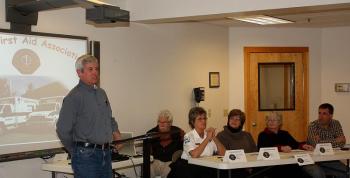 Steve Corson, chairman of the Camden First Aid Association Board of Directors, talks to selectmen, town managers and others from Camden, Rockport, Lincolnville and Hope Wednesday night. Also pictured, from left, CFAA paramedic Bill Bentley, EMS Chief Julia Libby, board member and Deputy EMS Chief Julie Allen, and board members Ramona Graves and Chris Sewall. (Photo by Holly S. Edwards)
Steve Corson, chairman of the Camden First Aid Association Board of Directors, talks to selectmen, town managers and others from Camden, Rockport, Lincolnville and Hope Wednesday night. Also pictured, from left, CFAA paramedic Bill Bentley, EMS Chief Julia Libby, board member and Deputy EMS Chief Julie Allen, and board members Ramona Graves and Chris Sewall. (Photo by Holly S. Edwards)
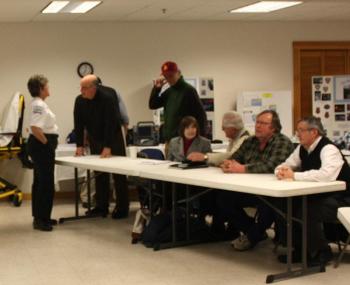 CFAA EMS Chief Julia Libby talks to Camden Select Board member Jim Heard, at a table with Leonard Lookner, Camden Town Manager Pat Finnigan, Don White, John French and Martin Cates. (Photo by Holly S. Edwards)
CFAA EMS Chief Julia Libby talks to Camden Select Board member Jim Heard, at a table with Leonard Lookner, Camden Town Manager Pat Finnigan, Don White, John French and Martin Cates. (Photo by Holly S. Edwards)
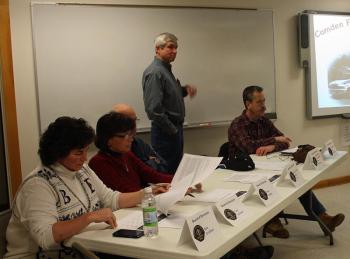 CFAA Board members Kim Graffam, Vicki Eugley, Skip Day (hidden), Steve Corson (standing) and Neil Courtney. (Photo by Holly S. Edwards)
CFAA Board members Kim Graffam, Vicki Eugley, Skip Day (hidden), Steve Corson (standing) and Neil Courtney. (Photo by Holly S. Edwards)
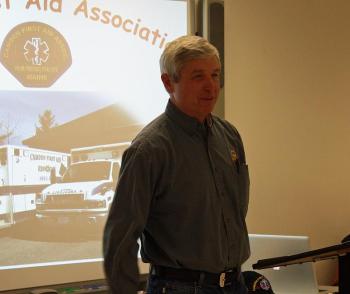 Steve Corson, chairman of the Camden First Aid Association Board of Directors. (Photo by Holly S. Edwards)
Steve Corson, chairman of the Camden First Aid Association Board of Directors. (Photo by Holly S. Edwards)
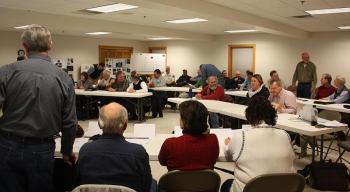 Selectmen and managers from Camden, Rockport, Lincolnville and Hope meet with the Camden First Aid Association board Feb. 27.(Photo by Holly S. Edwards)
Selectmen and managers from Camden, Rockport, Lincolnville and Hope meet with the Camden First Aid Association board Feb. 27.(Photo by Holly S. Edwards)
CAMDEN — Residents in Camden, Rockport, Lincolnville and Hope have serious decisions to make in the coming months if they want to keep Camden First Aid Association serving as the first responder when a family member suddenly falls ill, a friend or neighbor is injured or a visitor has an accident and needs timely emergency medical care and transport to a hospital.
That's what officials from all four towns were told last night at an informational meeting hosted by Camden First Aid Association EMS Chief Julia Libby and the CFAA Board of Directors, including Kim Graffam, Vicki Eugley, Tom Jackson (absent), Skip Day, Steve Corson (chairman), Julie Allen, Harvey Rudisaile (absent), Ramona Graves, Chris Sewall and Neil Courtney (vice-chairman). (Libby also sits on the board.) Also present at the Feb. 27 meeting were fire chiefs from the four towns and a few community members; town officials included managers and select board members.
Last night, the CFAA board told the towns that it is requesting a lot more money to provide ambulance services in the coming year – increasing from the $56,000 they received in 2012 to $407,000 for 2013. CFAA is seeking $174,000 from Camden, $129,000 from Rockport, $77,000 from Lincolnville and $27,000 from Hope.
Camden Select Board member John French said he has seen the evolution of CFAA over the years, and when it moved to its own building, he warned that the service needed to bill the towns at an increasing level each year to keep up with increasing costs.
"I have been a strong supporter for many years, but there is a history with these numbers. I understand them, and $154,000 is cheap, but I don't support it in one year as you should have been doing this all along," said French.
CFAA has served as the community's ambulance and onsite emergency medical provider since the 1930s. CFAA, under new management since 2011 following the termination of former EMS Chief and Board Chairman Chris Knight, is seeking to stem the bleeding caused by years, if not decades, of not charging enough for its services and being hindered by "bad decisions" that strained the service's finances.
The newly reorganized and empowered board said it is working to reach out to the community and educate it about what CFAA offers, how it is funded and how it operates. But as community leaders learned last night, CFAA and its board are open to a variety of future business model options, from bringing on more board members to reorganizing as a quasi-municipal organization, such as the Mid-Coast Solid Waste Corp. There was also talk of CFAA selling its equipment and assets to the towns and providing the services with municipal licensed and experienced personnel.
"We're here to say we are open to anything," said Libby, more than once during the nearly two-hour meeting.
For many years, CFAA has received annual allocations from each of the four towns it serves, but those figures have not reflected the rising costs associated with operating a service that provides dedicated, quality on-site emergency medical services and transportation. The town's allocations, which have come from their budget's Provider Agencies Expenditures lines, have only supplemented a small portion of CFAA's budget, with its revenue largely derived from billing patients and insurers for services.
Going back to 2008, the four towns in total allocated $38,500 annually for CFAA in their budgets through 2011, with all but Hope increasing their individual amounts in 2012 to a total of $56,000.
Camden gave CFAA $10,000 annually through 2011, and increased its allocation to $20,000 in 2012. Rockport's annual allocation from 2008-2011 was $19,000 and Lincolnville's was $7,500. In 2012, Rockport and Lincolnville increased their allocations to CFAA to $24,000 and $10,000, respectively. Hope has remained the same from 2008 to 2012 at $2,000 annually, and a portion of their town is also served by Union Ambulance.
In 2012, CFAA responded to 1,965 calls for service in the four towns. Of those, 882 were in Camden, 793 in Rockport, 176 in Lincolnville, 43 in Hope and 71 were classified as "other." CFAA's coverage region consists of a population of 11,160 year-round residents spread over 119 square miles.
Of the total 1,965 calls, 1,208 originated as emergency 911 calls, 300 were interfacility transports and 457 were unbillable nontransport calls that still required a response by at least one ambulance and a service provider.
CFAA currently has 10 full-time personnel, including a billing clerk and receptionist. It also has several per diem and on-call personnel that staff the ambulance station 24/7, and it maintains at least one paramedic on duty per shift.
"It has been a hard time for us. When I came on two years ago, it was a challenge. I can't talk about it, because it was part of our agreement with previous management, but we had a tough situation getting going again," Libby said bluntly. "We have grown from one ambulance to four, and we now run a jaws [extrication] truck and a technical rescue team. The jaws truck and technical rescue team are both run by volunteers, and the ambulances are run by paid staff. We have sleeping quarters for night crews and our night crews, which were once unpaid until they had a call, are now paid and keep busy when not on a call."
Before 2000, when the CFAA building at 123 John St. was built, ambulance crews worked out of the Camden Fire Station, 24/7. There were no showers back then, but the town originally provided the background services, including housing, electricity and dispatching services.
According to incomplete/condensed budget figures provided by the board at last night's meeting, CFAA's 2013 expenses total $1,093,200. Of that total, $993,200 is the proposed operating budget, including building maintenance, heat/utilities, insurance, payroll and taxes; $100,000 is the proposed capital budget. If the organization receives the full amounts sought from the towns, and can successfully collect from insurers and individuals for its billable services, it should break even.
According to those aforementioned figures, in 2012 the organization was in the red by $212,000, as far as a comparison of what was billed versus what was collected. CFAA reported making 1,965 runs in 2012, for which $864,000 was billed. Only $652,000 of that was collected, leaving $212,000 outstanding/uncollected.
Going back to 2009, $1 million was billed for 2,485 runs made, and only $573,000 was collected, leaving unpaid receivables of $427,000. The next year, 2010, was a bad year as well. CFAA made 2,476 runs for which it billed $935,000. But it only collected $548,000, ending the year with $387,000 unpaid.
Of the four years, 2011 was the "best" year, with only $127,000 uncollected. The service made 2,018 runs that year and billed $860,000, of which it collected $733,000.
Budget challenges, according to Libby, include the increased complexity in Medicare and Medicaid billing, and the reality that insurance companies only pay of portion of the bill, leaving the patient and their family owing the remainder. In addition, patients who refuse transport cannot be billed for the call and insurers will deny payment if they deem a transport is/was unnecessary.
Licensing requirements by state and federal law also add to the cost of doing business and maintaining staff.
"The cost of obtaining and maintaining a license to do the work make it impossible to be a volunteer," said Libby. "And everyone expects to have a paramedic on calls now, and you should. A lot of people don't know a paramedic from a driver, and they all assume that the person in the ambulance is a paramedic and that takes money."
CFAA's budget figures for July 1, 2013 to June 30, 2014, show a payroll expense of $477,500, with an additional $86,000 in payroll taxes and benefits.
One of the many complexities facing today's ambulance service involves who is allowed to do what when it comes to handling patients – injured or not. Libby said that Camden has numerous assisted living facilities in town, and caregivers are not always allowed to pick a resident up if they have fallen. To the layperson, it would seem such a simple task, but it's not when someone is being paid to care for another. And that kind of episode requires a call to 911, and a request for a licensed professional to both assist the patient and assess their medical condition.
Compounding the problem, said Libby, is if the fallen patient does not need to be transported to a hospital after CFAA gets there, CFAA does not get paid. That is also true for 911 calls downtown, when someone isn't feeling good or falls inside a business.
Camden Select Board member Leonard Lookner, a former restaurant co-owner, said a downtown merchant has to call for an ambulance when something happens inside their business, but sometimes by the time the ambulance gets there, the person feels OK and there is no transport.
"Those aren't billable?" said Roger Moody, acting town manager in Rockport.
"Not billable," said Libby.
When some in the room questioned how this could be true, Rockland Fire Chief Charlie Jordan said in his city, where his department also provides full ambulance service, it is true.
"We have a facility in Rockland where employees are told they will be fired if they pick someone up. It happens," said Jordan.
Paramedic Justin Hills added that when they go to a call for a heart attack, they can use up a lot of one-time use supplies working to save the patient.
"A lot of equipment can get used and if someone dies and we don't transport them, we don't get paid," said Hills.
"Then we need to change how we respond to these," said Rockport Select Board Chairman Bill Chapman.
Bill Bentley, who works part-time with CFAA as an ambulance driver and paramedic and also leads the technical rescue team, said that some of the questions being raised about why CFAA is not reimbursed for one thing or another, despite being required to respond, need to be asked at the state level. And in an effort to adjust with the changing face of medical care and response, and the financial strains it is putting on ambulance services, Bentley said CFAA is looking into applying to become one of 12 Community Paramedicine Pilot projects signed into law by Gov. Paul LePage last March.
Community paramedicine is meant to bridge the gap between hospitals and patients, mixing primary care and EMS response, in an effort to reduce unnecessary transports and emergency department visits. When a patient with a chronic problem keeps showing up the hospital, the hospital can't get paid for the additional visits and an insurer might also deem the transport unnecessary, and not pay for it.
The pilot project would allow CFAA to work on creating a model that delivers basic and preventive medical care to patients under a doctor's care in private homes and assisted living facilities. The pilot is meant to collect data and requires three years of data collection before broader implementation, and actual billing, could be approved and begun.
"If it goes well for three years, then we can get reimbursed," said Bentley.
Camden resident David Edwards said, "We are in crisis mode right now. What is the negative impact if you have to close?"
Libby said it would be up to each town to find someone else to contract out with. She also said that response times would likely increase, given that the closest competitor is in Rockport and only has two rigs.
French asked the board if they had an alternate funding source, if the towns were unable to get the new spending request approved by the voters.
"It sounds like you have no plan B, so say we say, OK, we agree with the number you are asking for, there is no telling what the budget committee and the voters will do," said French.
"No, we don't have a plan B," said Steve Corson, CFAA's board chairman.
"You are just a piece of the pie and here are a lot of other things we are facing before we know if you'll have your money," said French.
Rockport Select Board member Geoffrey Parker said to him, it looks like CFAA has a 37 percent shortfall, and maybe it was up to the town officials to go to their constituents and tell the community it has been well-served by CFAA.
"There is an opportunity to go the communities and say we have been lucky, we owe it to this service to fill in the holes. The holes are where they can't charge, those non-transports. And the non-transports are pretty equal to the deficit. A per capita charge is easy, but you could consider your non-transports per community and say, we did this service to the community and this is what we would like and perhaps, there would be a better response from ALL of us. You might want to look at how to help us deliver the message," said Parker.
Moody said CFAA could also consider asking the towns to help with the capital support.
"There is logic to that. Help us with the infrastructure, and you guys become responsible for the operating expenses," said Moody.
Charlton Ames of Rockport concurred, adding that if town officials were able to tell their communities that CFAA was doing a dozen actions to try and solve the problem, along with coming to the town for more money, "it would be easier to sell."
Parker then asked if the board was open to a capital contribution, where eventually the towns own the equipment and CFAA provides the service. "While there is five years of pain to buy the equipment, the communities are buying in. Our best resources are each other. I would jump on the capital investment bandwagon personally faster than I would to just stop the bleeding," said Parker.
"I am not opposed to that," said Libby. "I know we are going toward a regional service anyhow. We need to resolve this as a community, which is why I am here tonight."
Lincolnville Select Board member Rosey Gerry asked Libby if CFAA would require a contract from each town, if they were to agree to partner with them. Libby said yes, it was her preference, because then the "towns are vested" in the partnership.
"What about our charter saying we have to put stuff up for bid?" said Gerry.
"Then it's really important to get apples to apples bids. Our charter will allow us to not take the lowest bid because of other factors. So we could say from a long-term perspective, this is the reasonable thing to do, if it was," said Parker.
"If you go with the other business model, then we don't need to go through an RFP," said Gerry,
To which French said, "But you need the money now and it will take time to develop either model. They need money, that's it."
Camden Select Board chairman Don White said that whether it's a model of investing in equipment and/or adding to their board and considering a quasi-municipal model, or developing something altogether different, the leaders need to go to their towns for the money and pitch it.
The next step includes CFAA making presentations to the Camden, Rockport, Lincolnville and Hope budget committees in support of its 2013 Provider Agency funding request, but those at the meeting also wanted to continue working on a plan for a workable business model, either on its own or in partnership with the towns.
"We leave this meeting for the managers to continue meeting with Camden First Aid to be more vested, and we need to go back to our communities and ask for the money and give them the options," said White.
Camden Select Board member Martin Cates said, "I think that's good, because if one of the towns bolts, the whole picture changes."
And that brought up the question of Hope, and its potential impact on the CFAA picture should it in fact decide to work exclusively with Union Ambulance for its quoted $8,900 to cover all of Hope. (Hope currently pays $4,900 for half-service by Union.)
All heads turned, and Hope Selectman Brian Powers Jr. said, "The town is not a bank, and we can put the numbers in the pot and see what happens, and then next year, it might look different."
Hope Selectman Jason Hall said, "We can say here we think it's a great idea, but then we can go to the voters and they disagree."
Libby said if Hope bows out of the group, she wouldn't foresee her operating costs changing or eliminating staff, because Hope's needs were the smallest.
"If I don't have the crews here, I will have to pay Rockland to cover and that ends up costing me money," said Libby.
Parker then suggested creating a per-run cost, like Rockland does, and if Hope needs coverage because Union can't do it then they can pay for the service.
"It's a case where everyone is reasonably equally displeased," said Parker.
[Disclosure: David Edwards is married to Penobscot Bay Pilot Editorial Director Holly S. Edwards]
Editorial Director Holly S. Edwards can be reached by email at hollyedwards@penbaypilot.com or by calling 207-706-6655.
Event Date
Address
United States

